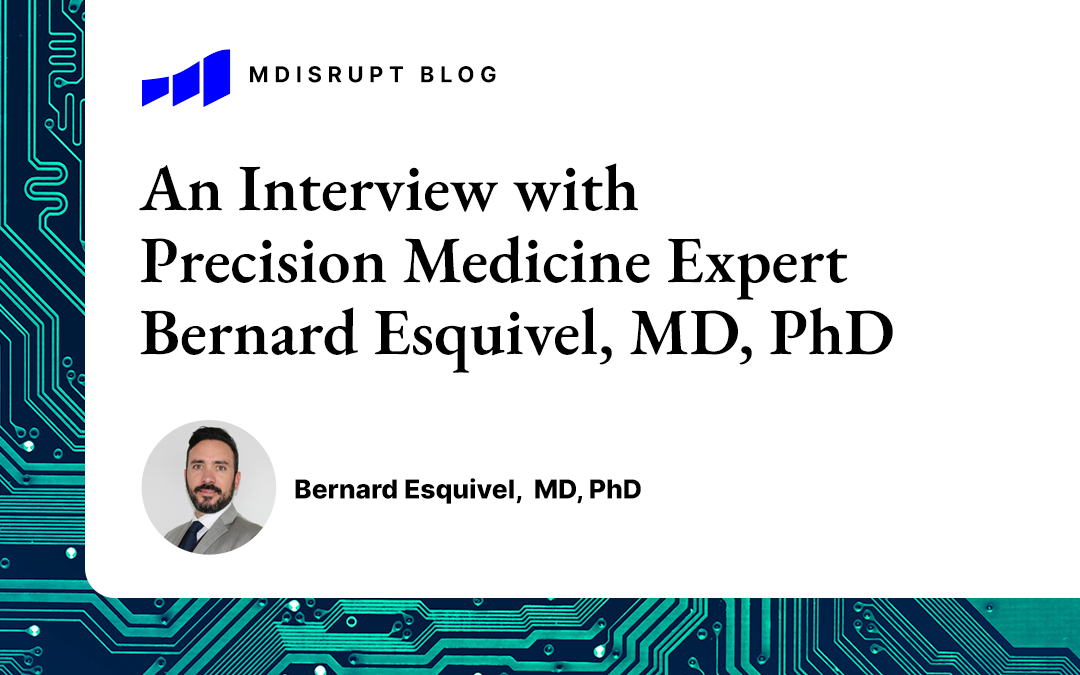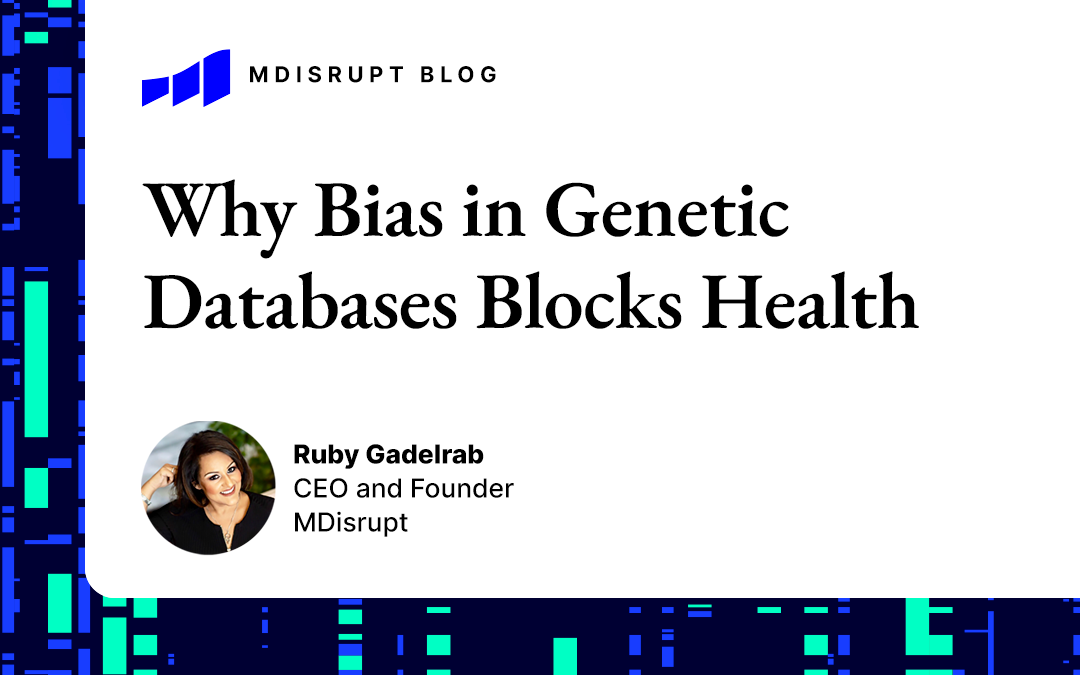
How Precision Medicine Can Transform Healthcare

Meet Bernard Esquivel, MD, PhD,
a leader in precision medicine.

Dr. Esquivel is a clinical immunologist-allergist and international business leader with expertise in developing new markets in genomics and precision medicine. He’s the founder and president of the Latin American Association of Personalized Medicine, ALAMP.
A passion for precision medicine
MDisrupt: Tell us how you turned your passion for precision medicine into a career.
Bernard Esquivel: During my medical training, I learned about the role our genetic information can play in influencing disease development. Once I started practicing medicine, I tried to start testing my patients, and understanding their genes, and then find a way to implement that into my workflow.
That’s when I noticed that, number one, it was very hard to find [genetic] tests. Number two, it was very hard to access the information needed to understand and clinically implement decisions based on that information. And number three, my colleagues thought that I was talking about Star Wars or some dark science.
So, facing those barriers, back in 2014 a colleague of mine and I founded the Latin American Association of Personalized Medicine (ALAMP). The aim was to share knowledge to foster the implementation of precision medicine.
I interacted with a lot of key opinion leaders (KOLs) globally from different fields of precision medicine. And I learned how they were implementing precision medicine, pharmacogenomics, cancer molecular testing, health wearables, and so on. Long story short, for the last 12 years I’ve been 100% into precision medicine, to find a way to bring these fantastic new tools closer to the patients.
Precision vs. personalized medicine
MDisrupt: How do you define precision medicine, and how do you see it as different from personalized medicine?
Bernard Esquivel: If we use the definition that cancer.gov has for precision medicine, it’s a form of medicine that uses information about a person’s own genes or proteins to prevent, diagnose, or treat diseases. But I think there are missing parts to this definition. One of them is “predict.” That’s where I believe precision medicine is heading: to predict, by using data from patients, subpopulations, larger groups, and N-of-1s, and using new technology such as machine learning, to predict how a patient will respond.
Also, precision medicine is not only about genetic information anymore. For example, there are different “omics”—metabolomics, epigenomics, nutrigenomics, proteomics, and also the social determinants of health that are crucial as well. Personalized medicine is specific to the patient.
Getting precision medicine adopted
MDisrupt: What are some obstacles to a widespread adoption of precision medicine?
Bernard Esquivel: The first barrier is the way we run clinical trials. We need to continue following an evidence-based approach, meaning we need to show clinical validity, clinical utility, clinical actionability, and so on. But precision medicine is unique because you may be talking about a single individual with a lot of data points.
The second barrier is about implementation and clinical actionability. For example, in pharmacogenomics, some genetic variants of CYP450 enzymes may impact how the patient will respond to certain medications. You need to take that to the next level: “What can I do next? Is there any other option for that patient? Are there clinical guidelines to help me to customize the dose for that specific patient?” That’s clinical actionability.
The third barrier is, precision medicine needs to be user-friendly for the provider as part of our day-to-day tools. If we don’t implement precision medicine data sets into the clinical workflow, it’s going to be a hard stop.
And last but not least is cost-effectiveness. We need to show that it makes sense to invest in the molecular testing and technological platforms that we need.
MDisrupt: When do you see us being able to bring all that information together to give an individualized view of the patient?
Bernard Esquivel: Within the next five years. I think we are getting there in terms of connectivity and data management. The milestone for the next five years is going to be about ethics—how those corporations are going to be managing, handling, and protecting your information as a patient.
Pharmacogenomics (PGx) in precision medicine
MDisrupt: What’s the ideal implementation of PGx in the health care delivery model?
Bernard Esquivel: Pharmacogenomics is a fantastic example of how precision medicine has evolved. One of the barriers has been the lack of standardization. We need to be sure that our [variant] coverage is as similar as possible in order to compare apples to apples.
The other one is about how you interpret that data, the phenotyping calls. How are you calling [a particular] genetic variant and what are the clinical implications? Several organizations are doing outstanding work trying to tackle those problems. And I strongly believe that champions of pharmacogenetics are and will continue to be the pharmacists.
PGx success
MDisrupt: Is there an example of a health system that has been successful in implementing a PGx program?
Bernard Esquivel: Yes, several. St Jude’s Hospital has been a pioneer in implementing PGx into the electronic medical record and having expert pharmacists help other providers implement it. Also Mayo Clinic with its center for individualized medicine.
The Netherlands is a fascinating example of a countrywide PGx implementation. They use a single electronic medical record for the entire country. They already have a specific PGx piece that will follow the patient wherever they go. They’re publishing data on how they are saving money countrywide by using pharmacogenomics.
How digital health innovators can improve precision medicine
MDisrupt: When you think about precision medicine, what could digital health innovators do more of and what are they not doing enough of?
Bernard Esquivel: Number one will be having a smooth workflow in terms of integration. Then, once you’ve got all those data sets, how are you going to start organizing that information? You need to allow new technologies such as machine learning to start making predictive models, then [integrate] that information with genomics, microbiome, exposure, behaviors, clinical tests, even patient contributed data. And then find ways to connect all that to clinical information and deliver it to the final user. I know it sounds hard, but many people are working on this right now.
MDisrupt: What advice would you give a founder interested in precision medicine solutions?
Bernard Esquivel: Have the right experts working with you. If you don’t make that investment at the beginning, it’s going to be way more expensive “learning during the flight.”
With the right team on board, I recommend three pillars: Number one, the regulatory landscape—look into the regulatory requirements, talk about your idea with the regulatory agency.
Then, invest in developing the right evidence behind your product. And number three is clinical actionability: You can go-to-market with the minimal viable product, but you need to always be thinking of how this information will trigger action from the clinical standpoint.
Healthcare’s future
MDisrupt: What do you think the health system is going to look like in 10 years?
Bernard Esquivel: We know that the way we are spending money in healthcare is not working. So everything will change into value-based care and precision medicine will play a critical role there.
At MDisrupt we believe that the most impactful health products should make it to market quickly. We help make this happen by connecting digital health innovators to the healthcare industry experts and scientists they need to responsibly accelerate product development, commercialization, adoption, and scale.
Our expert consultants span the healthcare continuum and can assist with all stages of health product development: This includes regulatory, clinical studies and evidence generation, payor strategies, commercialization, and channel strategies. If you are building a health product, talk to us.


